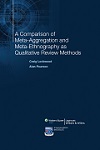
Craig Lockwood, Alan Pearson
This monograph examines and explores the assumptions and debates associated with qualitative synthesis within the health sciences and is based on the work of one of the authors (Lockwood, 2011). While some methods have been established for years and others are more emergent, all are evolving. Whilst this development occurs, several approaches in particular have been used in the conduct of systematic reviews of qualitative research that have risen to the fore in the published literature. There are two approaches to qualitative synthesis that are dominant in contemporary debates: meta-ethnography and meta-aggregation.
Meta-ethnography is grounded in primary research traditions from the social sciences. It is conceptualized as an approach to generating new theoretical knowledge related to sociological interests and does not seek to aggregate knowledge, but to interpretively generate new theoretical frameworks. The outputs of a meta-ethnographic review do not bring together the existing research as much as they generate new findings that extend the theoretical assumptions of the primary research.
Meta-aggregation has its roots in the health sciences. Its developmental history is grounded in philosophic perspectives that have a good fit with the needs and expectations of evidence to inform healthcare decision-making. Meta-aggregation is a method of systematic review that mirrors the processes of a quantitative review whilst holding to the traditions and requirements of qualitative research (it aggregates findings into a combined whole that is more than the sum of the individual findings in a way that is analogous with meta-analysis).
In spite of these differences both methods are now used widely across the health and social sciences and a series of ambit claims to legitimacy have been made by various authors seeking to forward their preferred methodology. This has generally occurred through the publication of a review by way of an example of the strengths and utility of the methodology being promoted, generally by people with vested perspectives.
This juxtaposition of emergent methodology and associated ambit claims, along with the actual conduct of reviews, is the central focus of this book. Specifically, our intention is to examine and understand the impact of methodological choices on the systematic review product itself (i.e. the findings of the qualitative systematic review); and to illustrate this by drawing on the work of one of the authors (Lockwood, 2011).
Methods have developed from different fields using different theoretical frameworks, yet defining the fit and appropriateness of specific techniques for particular theoretical perspectives has not been investigated, although there are ardent advocates for each approach.
Our purpose of exploring qualitative synthesis is to contribute to wider understandings of the methodological implications of particular approaches on the findings of qualitative reviews and to compare and contrast the two methods to clarify whether particular methods are more suited to different types of questions and theoretical frameworks.